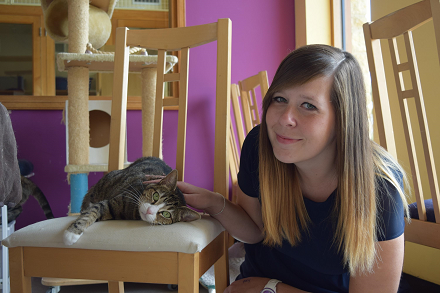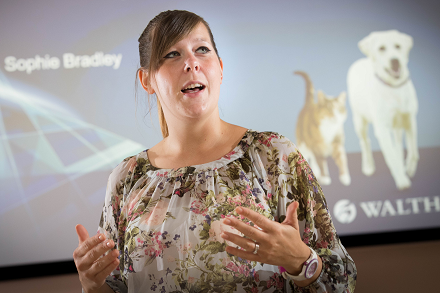Sophie Bradley
Helping felines feel-lean
Obesity rates in cats are rising fast. In the UK alone, nearly 80% of veterinary professionals reported an increase in pet obesity between 2014 and 2016, according to a recent PDSA report. As with humans, diet and exercise when young seem to have a significant impact on pet bodyweight in later life. But just how these factors interact in animals is not well understood. This led researcher Sophie Bradley to delve further into the correct feeding amounts needed to prevent kittens becoming overweight. This should reduce their risk of becoming obese adult cats. However, her path to companion animal nutrition was somewhat unique.
“I’m actually a neurobiologist, at least that was the field in which I earnt my PhD. I developed an interest in nerve signalling during my animal science undergraduate degree at the University of Nottingham. This led me to apply to do a PhD at the University of Leicester. My research uncovered a novel role for nitric oxide in the development of the nerves that control muscle movement, the motor neurons.”
“I continued in neurobiology research with two post-doctorate positions, one at the University of Leicester and the other at the Medical Research Council. The first involved using computers with the engineering department to sort data from multiple nerves to better understand movement. The second project was focussed on the role of nitric oxide in neurodegenerative diseases. However, WALTHAM had made a lasting impression on me. I first heard about the pet centre at a careers talk during my undergraduate degree. I could see that this would be a place that I would be able to combine my passion for pets with my love for science. I knew that I wanted to work there and that drive never left me. Even though I initially took a different career path, I never forgot about WALTHAM. It took me a couple of attempts but eventually I landed a job as a research specialist in the Pet Nutrition and Health team”.


“Although my previous research area has no direct link to my current work, there are still plenty of transferable skills. A PhD equips you with the skills to work independently and drive your own project, as well as dealing with challenges and failures. Science is fraught with unexpected results, but learning how to cope with these is applicable to so many situations”.
“Working at WALTHAM gives me the opportunity to work with such a broad range of people. The diversity of our projects means that I partner with academic collaborators as well as fellow associates around the globe who work directly with our brands. No day is the same. So far my projects have spanned monitoring the activity of our dogs to the energy requirements of kittens.”
Sophie’s most recent research has been investigating feeding levels for kittens after neutering, as subsequent weight gain is frequently a problem. “The National Research Council sets nutritional standards for the pet food industry. Their current guidelines however, do not differentiate between entire and neutered animals when it comes to maintenance energy requirements. Therefore I wanted to understand if the current recommendations were over estimating these requirements for kittens post-neuter.”
“For this study, I worked with 60 playful kittens. I used body condition scoring to regularly assess their fat distribution along with monitoring their weekly weight and daily food intake. We could then compare our data of their required intake for maintaining an ideal body condition score to the NRC guidelines. We discovered the NRC guidelines overestimated the energy requirements for both male and female kittens after 40 weeks of age. But, surprisingly, under estimated the intake needed for male kittens up to 30 weeks of age.”
“Hopefully the results from this study will be able to help produce more accurate recommendations for kittens, which will in turn help reduce cat obesity.”





